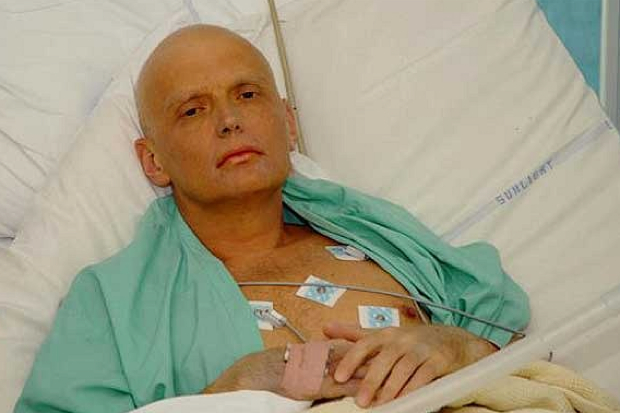Is the West ever going to stand up to Vladimir Putin?
an edited version of this article was published at The Spectator, 21st January 2016

Alexander Litvinenko (Photo: PA)
If you walk down Holland Park Avenue, down the hill to Shepherd’s Bush, you’ll come across a statue wreathed with peonies, lit by a single candle. Two years ago, in February 2014, the flowers stretched almost to the street curb; the candles were myriad, ringing the statue in ever-widening concentric circles. This is the statue of St Volodymyr, founder king of the Ukrainian nation, set up in the old heart of the British Ukrainian community.
In the days around the fall of the Yanukovych government, and Russia’s subsequent annexation of Crimea, St Vlad was the site of nightly vigils, passionate and prayful protests, many of them led by orthodox priests. Gradually, the wreaths shrunk, the candles disappeared one by one. Someone still replaces the last cluster of flowers. But to those of us who walk past every day, it is a floral memorial to a wilted cause. The days when diaspora Ukrainians hoped that the West might challenge Putin in their homeland are long behind us.
Sir Robert Owen’s inquiry into the death of Litvinenko, published today, tells us what we already know. Specifically, it tells us what our government already knew: that classified evidence, long held by MI6 and other secret services, had already traced Litvinenko’s contact with his killer, Andrei Lugovoi, and established the FSB’s culpability. The government has been aware of this for nearly ten years. During that time Putin has sown chaos in Eastern Europe, annexed not just Crimea but South Ossetia (remember that?), provided the missile that downed Malaysian Airlines Flight 17 and funded Bashir ‘The Butcher’ al-Assad’s bloody dealings in Syria. Those who ordered the death of Anna Politkovskaya remain unidentified – to understand the impact of her journalism on Russia, I urge you to see the searing documentary A Bitter Taste of Freedom. But you don’t need an arthouse cinema, or access to a secret dossier to know how miserably successive British governments have failed to confront – or even ‘contain’ – Vladimir Putin’s aggression. You just have to read the news – and if that’s too hard, you just have to walk past a shabby, defiant little statue in West London.
By now, much of the game feels over and shut. As I and many others have argued in the past, failure to intervene earlier in Syria has fuelled the rise of ISIS – exactly as Putin’s proxy, al-Assad, had hoped. Wherever you see an Islamist uprising in the Middle East, you’ll see a secular dictator pointing loudly at them and shouting at the West: ‘it’s them or me’. Again, a man who gasses his own civilians, is pulling off the same trick. And we’ll be told by newscasters, by spokesmen, by cautious backbench MPs, that this means we can’t get too grumpy with helpful Mr Putin when he accidentally spills polonium over a British citizen in Waterloo. Because we need him to help prop another dictator, in Syria. Presumably to protect the human rights of the miserable unfortunates living under ISIS. Even though Assad’s airforce, funded by our old friend Vladimir P, has seemed so willing to help out ISIS in the past, when the enemy was merely the moderate Syrian opposition.
Meanwhile in Crimea, however, and in Russian-controlled cities like Donbas, Ukrainians allege that Mr Putin’s men are quite capable of chilling human rights abuses themselves. Certainly, the Ukrainian language and culture has been systematically erased from areas under Russian control. Ukrainian artists have been transported out of the region to serve long prison sentences in Russian jails – the filmmaker Oleg Sentsov sang the national anthem as he was sentenced to 20 years in ‘a court of occupiers’. Amnesty International called it a “Stalinist-era show-trial” – yesterday, as Latvia marked 25 years since the last Soviet crackdown of the Cold War, the dangers of a Russian occupation seemed an all-too recent threat.
Meanwhile, at Davos, Ukrainian ministers are pushing for another round of talks on Crimea’s future. Perhaps we’re too in hock to Putin in Syria to help much – certainly, Dimitri Medvedev would like us to consider the matter closed. But as we leaf over the details of Alexander Litvinenko’s torturous death – himself a former FSB agent – perhaps the West, with our new found pallyiness, should remember one thing. Nasty things seem to happen to people who spend too much time working with Vladimir Putin. And the benefits of friendship seem few and far between.




